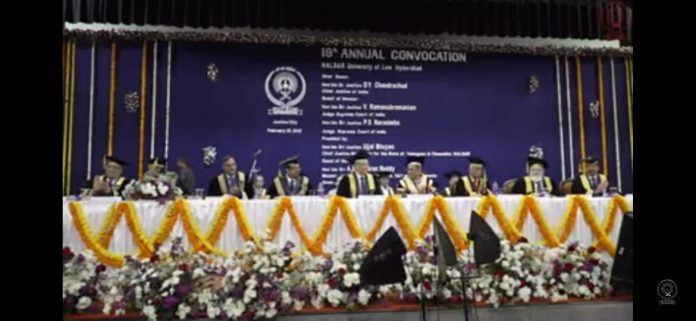Chief Justice of India D.Y. Chandrachud on Saturday expressed concern over the rising number of suicide by students belonging to the marginalised communities and said that in order to tackle the issue, it was important to acknowledge and recognise the problem.
Delivering the keynote address at the 19th Annual Convocation of National Academy of Legal Studies and Research University of Law (NALSAR), Hyderabad, the CJI mentioned the recent suicide of a Dalit student at IIT Mumbai. He said it reminded him of suicide by an Adivasi student at the National Law University in Orissa last year.
Stating that his heart went out to the family members of these students, Justice Chandrachud said he was wondering where the educational institutions have been going wrong that students were forced to give up their precious lives.
Stating that suicide by students from marginalised communities was becoming a common phenomenon, Justice Chandrachud said these numbers were not just statistics, but they were stories, sometimes about centuries of struggle,, which need to be addressed with empathy.
Stressing that education should be viewed through the lens of empathy, he said educational institutions only laid their focus on excellence. Students were taught that their lives would be better if they excelled in studies or in their professional lives.
However, education could only be considered complete if these institutions nurtured the values of empathy and compassion. The institutions must not limit themselves to promoting competition among students, but also shape their outlook towards life where empathy was a crucial component and element.
Stating that excellence in life could not go without empathy, the CJI said life with empathy in educational institutions would have a great effect on students. He further stressed on improving the mental health of students.
The educational curriculum must inculcate a sense of compassion among students, noted the CJI, stating that the academic leaders must also be sensitive to the concerns of students.
Noting that different students faced different challenges, the CJI said when a student left his home and came to an educational institution, it became the responsibility of the educational institution to establish a bond of institutional friendship with him.
He further said that even judges could not shy away from social realities, stating that instances of judicial dialogues were common across the globe.
The CJI exemplified the Black Lives Matters movement of the US, stating that after the murder of George Floyd, all nine judges of the Washington Supreme Court released a joint statement addressed to the judiciary and the legal community on the degradation and devaluation of Black Lives in the US.
Harvard University Prof. Michael Clurman noted that history tends to forget equally ground-breaking work that several civil rights lawyers did outside the courtroom in educating the Black community about their rights under the Constitution, noted Justice Chandrachud.
He said judges in India had a similar and crucial role in initiating a dialogue with the society inside and outside the courtrooms to push for social change.
He further said that as CJI, apart from his core judicial work and administrative duties, his effort was also to throw light on structural issues, which confronted the society. Promoting empathy must be the first step which educational institutions ought to take. Nurturing empathy can end the culture of eliteness and exclusion, he added.
The CJI said that small steps can bring about a big change.
He said allotment of hostels on the basis of entrance marks lead to caste-based subjugation. Putting out a public list of marks along with categories; asking for the marks of Dalit and Adivasi students publicly to humiliate them; making a mockery of their English and physical appearances; stigmatising them as inefficient; not acting on incidents of abuse and bullying; not providing a support system and reducing or stopping their fellowships; and normalising stereotypes through joke, were some of the practices that every educational institution must stop, he added.
Practising empathy was not just a personal attribute, but required an institutional change in every walk of life within and outside the judiciary, including the educational institutions. Empathy can reflect on the state of legal education in a much broader way.
When law was approached with empathy, it recognised the people who came before the current lot in the legal system. These were not just names on a docket, or numbers in a statistic, but people with real lives and real struggles.
Their circumstances and experiences may have been different, but the students should try to see the world from their perspective. Such an understanding should be at the foundation of legal education. This was the idea behind the creation of National Law Universities (NLUs), he added.
The CJI said that Bar Council representatives and members of the Bar and judiciary need to sit together and reflect upon the state of clinical legal education in India.
It was important to reshape the legal education model, in order to make empathy a core value of the legal system.
He called upon the gathering to address the structural inequalities built into the legal system and create a system that truly reflected the shared values of justice.


